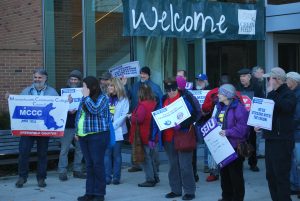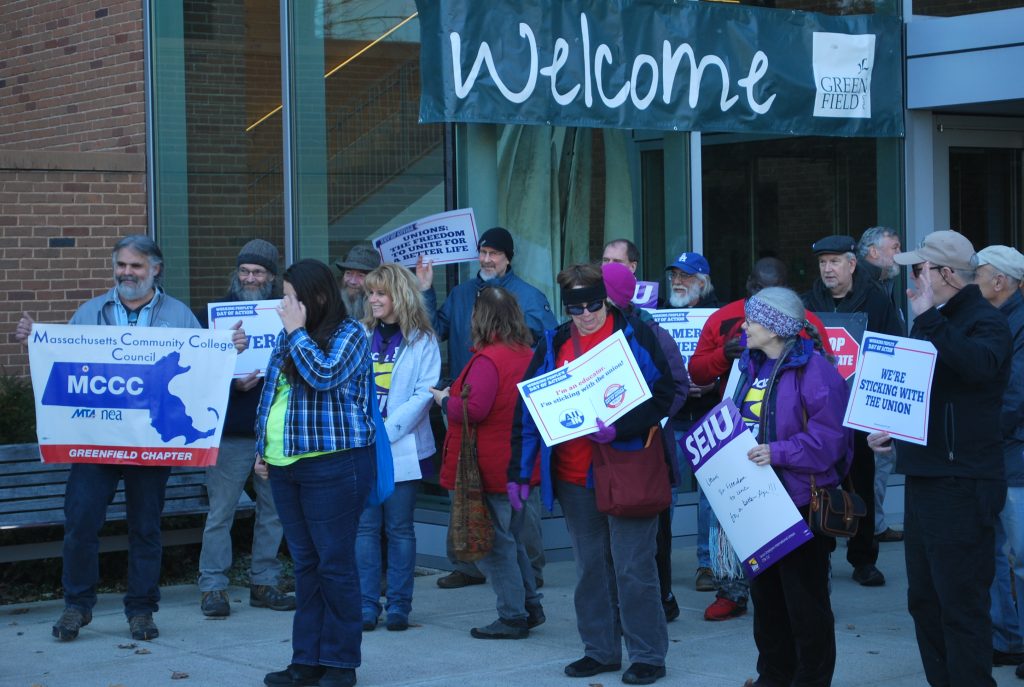More than two dozen workers and union rights activists rallied outside the campus entrance of Greenfield Community College (GCC) on Monday, Feb. 26, to stand in solidarity with thousands of workers from around the country during the Workers’ Day of Action.
The rally, hosted by the Hampshire/ Franklin Labor Council, coincided with Supreme Court hearings regarding the Janus vs. AFSCME case, which could weaken the ability of public sector employees to unionize by eliminating agency fees — a currently mandatory fee that covers the cost of negotiating and enforcing a union contract. If the Supreme Court rules in favor of Janus, public sector employees would be allowed to stop paying dues while still being protected by their union. The Supreme Court is slated to make its decision in early summer.
State Rep. Paul Mark (D-Peru) said he’s been a card carrying and dues paying union member since he was 16 years old with the International Brotherhood of Electrical Workers.

A group of workers at the rally at Greenfield Community College on Monday, Feb. 26. Chris Goudreau photo
“My father was a teamster and his father was a union electrician as well … Thanks to being a union member, it made such a difference in my life. I had fair pay. I could buy a house when I was 24 years old because I was paid fairly at Verizon. I had healthcare benefits. I had a pension. I had access to sick time. I had access to a tuition plan that paid 80 percent of five degrees that I got in 10 years that I never could have had without that ability. I have this because people who I worked with joined a union and stood together and were willing to go on strike and go without for other people like them.”
He views the the Janus vs. AFSCME case to be about “free rider syndrome,” which Mark describes as “I want all the benefits of being in a union, but why would I actually be a member?”
Mark said battles for fair pay and union rights continue to this day under a right-wing political climate that favors corporate interests over economic justice for workers.
“It’s wrong for the federal courts to take away the rights of states to decide how their public employees should be treated,” he said. “They should have the right to access public employee benefits and collective bargaining because that’s determined at the state level for public employees.”
Greenfield City Councilor Sheila Gilmour, vice president of the University Staff Association union for clerical workers and accountants at the University of Massachusetts Amherst, said she worries about the workers of the future if the Supreme Court rules in favor of Janus.
“I don’t know where they’re going to draw their strength if they don’t have the solidarity that you have from a great labor community like we have,” she said. “They’re going to try to take away agency fee and whatever they can, but as long we’re still here, still volunteering, and we still show up for each other, and we all stick with the union and hopefully in three years it can only get better.”
Anne Wiley, a decades long professor of psychology, gender, and women’s studies at GCC, said for the last five years she’s served as an adjunct faculty member. Eighty percent of the faculty at GCC is part-time. When she first started working at the college, 80 percent of professors worked full-time hours.
“Right now, the adjunct professors across the 15 community colleges [in Massachusetts] are working without a contract,” she said. “Our contract expired a year ago in June. We had an extension and there’s still time to come to the table.”
She said in 1965 close to half the workers in the United States belong to a union. Today, only 11 percent of workers have a union, most of which are public employees such as teachers and government officials.
Ann Valentine, a middle school teacher in Greenfield who has worked in the district for 25 years, said she finds it empowering for teachers to come to the negotiating table with the strength of her union.
“There are some people who are afraid to have their voice,” she said. “They feel that they might be retaliated against and I try to encourage them to say, ‘Show your voice. Use your voice. Come to the table as part of the union.’”
Donna Stern, a registered nurse and co-chair of the nurses’ bargaining committee at Baystate Franklin Medical Center, said her private union stands hand in hand with all union workers.
“The union has given me a voice; has given me confidence, not only as a worker, but as woman, to stand up and fight for what is right,” she said. “What is right is that we fight for each other. As a nurse that means I fight for my patients and that could be you.”
Mark said workers rights in the United States were hard fought throughout the country’s history and today is no different.
“What I learned in law school is that since the beginning of this country big corporations in the ultra right wing will use the law and use the courts to try to take away that right,” he said. “We have cases back in 1806. Shoemakers in Philadelphia – they were charged with conspiracy and restraint of trade. We had, throughout the 1890s and 1920s, injunctions to end strikes and force people to work against their will when they wanted to be out their fighting for their own economic interest.”
Chris Goudreau can be reached at cgoudreau@valleyadvocate.com.



